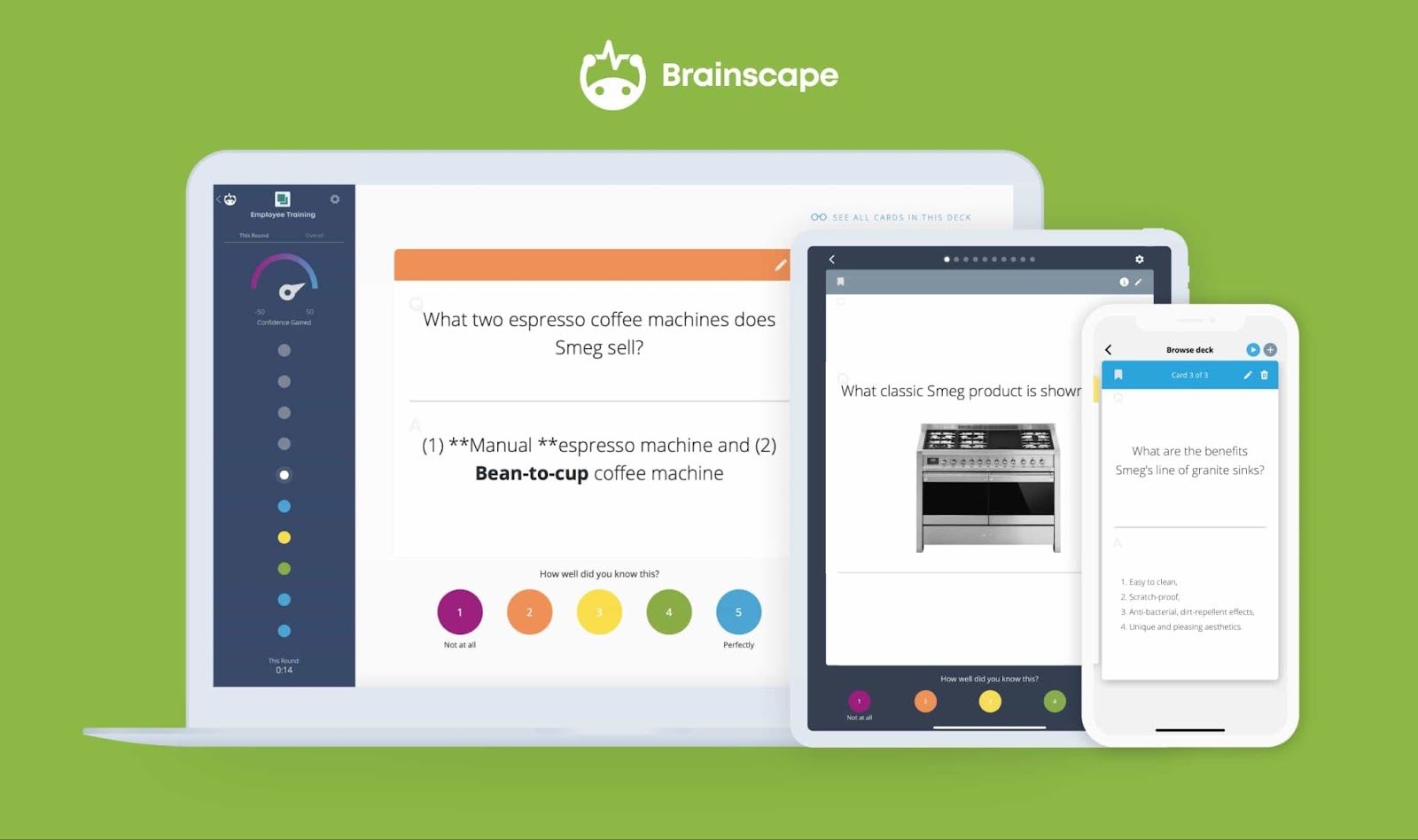Here’s a true story…
In the Paleozoic Era, when I was fresh out of high school, I got a one-time gig at a home expo as a sales rep for Smeg, an Italian appliance brand. It was through a friend—let’s call her Hannah—who was a regional sales manager.
The job was simple: look approachable and answer questions about the showroom models. But to do that, I had to study an inch-thick manual filled with highly technical specifications, the likes of which would put an insomniac to sleep.
The expo rolled around, and I wafted about, trying to look like I belonged, yet avoiding contact lest I be asked any questions. Inevitably, however, I was cornered by a couple who were interested in an eight-burner stove that was so expensive, I almost apologized for it.
They asked one question after the other and… I choked. Disappointed, they were seconds from walking away when Hannah, the sales manager, stepped in, her red cape flowing in the air conditioning.
Hannah was an expert on her Smeg inventory, down to the dimensions of the nuts and bolts that held those overpriced, gaudily-painted things together. She also loved the brand. And within minutes, that couple was utterly beguiled by her passion and her deep and fast-flowing current of product knowledge.
She’s a natural-born salesperson who effortlessly talks the talk but also knows her sh*t, and THAT’S why the couple ended up purchasing a stove that cost the GDP of a small country.
Hannah was the conduit through which they made that purchase, not because they liked her, which they did, but because they believed that she cared about solving their problem (which was that they didn’t have enough gas hobs to cook for an army platoon). They trusted her. As fancy, beautiful, and kitted out as that stove was, it didn’t sell itself. Hannah sold it.
In other words: people buy into people, and THAT’S the value of a great salesperson.
[Read: Does your eLearning use good cognitive science?]
The makings of great salespeople
Companies hire salespeople because they’re go-getters, charismatic, can talk the talk, and bring the deals across the finish line. But in a heartbeat, all of these attributes can count for nothing if that salesperson doesn’t know your business like I didn’t know the first thing about Smeg’s high-end, eight-burner stoves.
See, people typically buy from people they trust, like Hannah, and it’s difficult to trust people who are ignorant, and who promote the products they sell but don’t seem to know them or how they can solve your problems.
This makes it feel like they’re only selling to you because they care about the money, not about you. And if they don’t care about you, why should you trust them to recommend what’s right for you?
It’s not enough to have charisma and charm. For sales professionals, product knowledge is the crux of the job. Without it, they can come off as unreliable, or, worse... negligent.
This drives home the importance of proper product knowledge training. A talented performer is nothing without knowledge of the game. The problem is—as you’re likely well aware—dispensing that knowledge in a cost-effective and efficient manner is easier said than done!
[Read: What every employer should know about online sales training]
Employer: “Here’s your homework for the weekend!” *Dumps a bible-length binder on your desk*
From forecasting, prospecting, and negotiating to relationship building and more, countless topics are worthy of development, many of which often require at least some face-to-face instruction. Unfortunately, there’s only so much time and money available for sales training before employees are expected to get out there and do what they were hired to do.
So, guess what typically gets cut from the agenda? Product knowledge training.
To compensate, employers hand their salesforce a bible-length binder and expect them to study it during their downtime (because that’s what sales pros have: tons of downtime to study mountains of information, said no one ever.)
The result? Salespeople waltz into their positions without the right product knowledge training, and the company’s sales funnel suffers.
On the flip side, your company might be spending thousands of dollars (if not more) on sales training but, as this article points out, too many programs completely miss the mark on actually preparing salespeople for the job, whether it’s because employees aren’t using the tools properly or the tools themselves are just inefficient at ingraining knowledge.
Either way, companies—from small businesses to giant corporations—are sitting with the following problems:
- They throw a ton of money into sales training, but salespeople don’t feel properly trained;
- They know how important having knowledgeable sales staff is, but they’re so anxious to get them out onto the floor that they cut corners on proper product knowledge training; and
- Even when they do offer sales training, it’s often in a completely indigestible format (a two-ton training manual) with expectations that are completely unrealistic, if not downright unfair (“study this in your downtime”).
What’s the solution?
The ingredients for successful product knowledge training
To properly train your team and prevent the rejection and disappointment of lost deals, you need to provide the necessary sales training in ways that are relevant to your employees and their daily interactions. There are six keys to achieving this:
- Keep sales training succinct: Salesfolk are often traveling or in the field selling, which leaves little time for classroom training or studying a thick manual. Bite-sized, laser-focused training modules get to the point and take advantage of the learner’s limited time and concentration.
- Keep it convenient: For the same reason mentioned above, the more convenient the sales training—and the better it fits into their schedule—the more likely your salespeople will use it (and use it with enthusiasm). Mobile solutions are almost always the most efficient and convenient format for product knowledge training.
- Emphasize benefits over features: Yes, specs are important to some. Most buyers, however, purchase a story. “This phone offers a 40% memory increase over your current model, allowing you to reduce backup time” vs. “the Platypus XPL SIM card carries 37 more teraflops of RAM”. – Yes, I know there's no such thing as a teraflop.
- Teach the relevance: Some sales prospects are looking for the basic, “check the box” solution that will bring them in, at, or under budget. Others want the top-of-the-line VIP feature package. Then there are those who fall in the middle. Your team needs to know how to speak to all three types of prospects and cut straight to the product/service benefits that will most appeal to each.
- Personalize the training: Importantly, the sales training should provide frequent formative assessments, constantly adjusting to the learner’s needs so that their limited training time is spent targeting their highest areas of learning opportunity (and difficulty).
- Provide a lightning-fast point of reference: Finally, a simple, mobile resource for information and study containing all the relevant data points necessary to answer a prospect’s questions. No more “I don’t know” or “I’ll find out’s.” Your clients now view them and your company, as true subject matter experts they can trust to guide them in their decision-making process.
Wouldn’t it be nice if you could wrap all six of these keys—with the added benefits of hyper-efficiency, improved engagement, quicker comprehension, and longer retention—thrown into the mix?
Well, look at that. You totally can!
The key is Brainscape.
Product knowledge training (with Brainscape): the secret to a greased sales funnel

Brainscape is a study app—the world’s smartest—that leverages decades worth of cognitive science research to help people learn knowledge-intensive subjects (like your company’s catalog of products and services) so much more efficiently than with any traditional study method.
It makes sense, doesn’t it? If you want to learn efficiently and remember permanently, you should be working WITH your brain’s hardwiring and not AGAINST it.
And yet, most product knowledge training is delivered linearly, presenting the information ONCE in a seminar, video, or by reading, with the employee never seeing it again. Is it any wonder then that, according to a study by Sales Performance International, HALF of the content of any product training event is typically lost in five weeks?
The key ingredient that is missing from almost ALL forms of product knowledge training is systematic repetition over time.
